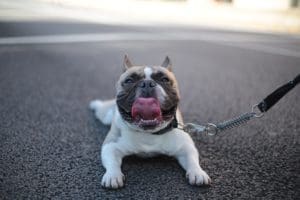Top 3 Causes of Heat Stroke in Dogs and How to Avoid Them
 Our four-legged friends are not immune to heat-related illness. Heat stroke, even here in Upstate New York and New England, is a very real threat to our pooches when the air temperature rises. Add a tropical dew point (registering in the 60s or higher) and it becomes a priority for pet owners to keep their canine (and feline) charges cool and comfortable.
Our four-legged friends are not immune to heat-related illness. Heat stroke, even here in Upstate New York and New England, is a very real threat to our pooches when the air temperature rises. Add a tropical dew point (registering in the 60s or higher) and it becomes a priority for pet owners to keep their canine (and feline) charges cool and comfortable.
Now that doesn’t necessarily mean Fido should forgo his daily exercise routine but it’s really important to be mindful of some key factors – even on the less oppressive, sunny days, according to Dr. Justine A. Lee, a board certified Emergency and Critical Care veterinarian and national expert on the matter.
Recognizing and avoiding the Top 3 causes of heat stroke can prevent tragedy. Lee cited the following:
- Locking a dog in a car without adequate ventilation. Cracking the window open will not suffice. Leaving the air conditioner running in the car and limiting the dog’s time alone to five minutes or less – or best yet, just leave pooch home.
- Exercising with your dog in excessive heat and humidity. The temperature doesn’t have to be a sweltering 90 degrees to threaten Fido’s well-being. Dr. Lee suggests adding the air temperature to the relative humidity’s score for the day. If the sum equals greater than 160 it’s too hot to take your dog on a run.
- Leaving a dog outdoors in the heat without adequate water and shade/shelter.
Dogs are in the danger zone when their body temperature rises above 103 degrees Fahrenheit (39 degrees Celsius). The higher the body temperature, the more life-threatening it is to your dog, states Lee in a Pet Health Network article titled Keep Your Dog Cool This Summer; Heat Stroke, Part 1.
And there are pre-existing canine health conditions that can predispose your pooch to heat-related illnesses. If you know your dog has any of the following you should take extra care to avoid exposing her/him to heat exhaustion. They are:
- Brachycephalic syndrome (e.g., a smooshed nose, smaller nostrils than normal, etc.). Pugs, English bulldogs, Shih-Tzu’s, Bullmastiffs, Pekingese dogs, etc. Basically, if your dog snores at night when he sleeps, he’s likely to have Brachycephalic syndrome.
- Laryngeal paralysis (a cartilage problem that makes your dog breathe louder than normal at rest)
- Obesity (Exercise with your dog to help him lose weight, but do so during cooler parts of the day like mornings or evenings)
- Heart or lung disease
When in doubt about the safest time to be outdoors with your pooch during the Dog Days of Summer, consult his or her veterinarian.
